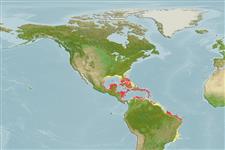Echinoidea |
Camarodonta |
Toxopneustidae
Environment: milieu / climate zone / depth range / distribution range
Ecology
Benthic; depth range 0 - 55 m (Ref. 83942). Tropical
Atlantic Ocean: throughout the Caribbean and western Africa.
Length at first maturity / Size / Weight / Age
Maturity: Lm ? range ? - ? cm
This is an epibenthic, subtidal species (Ref. 83942), found on Thalassia sp. beds (Ref. 86574).
Life cycle and mating behavior
Maturity | Reproduction | Spawning | Eggs | Fecundity | Larvae
Members of the class Echinoidea are gonochoric. Fertilization is external. Brooding is common, eggs are held either on the peristome, around the periproct or deep into the concavities on the petaloids. Life cycle: Embryos develop into planktotrophic larvae (echinoplateus) and live for several months before they sink to the bottom using their tube feet to adhere on the ground where they metamorphose into young urchins.
Collin, R., M.C. Díaz, J. Norenburg, R.M. Rocha, J.A. Sánchez, M. Schulze, A. Schwartz and A. Valdés 2005 Photographic identification guide to some common marine invertebrates of Bocas Del Toro, Panama. Caribbean Journal of Science. 41(3):638-707. (Ref. 415)
IUCN Red List Status
(Ref. 130435: Version 2025-1)
CITES status (Ref. 108899)
Not Evaluated
Not Evaluated
Threat to humans
Human uses
| FIRMS (Stock assessments) | FishSource |
Tools
More information
Population dynamicsGrowthMax. ages / sizesLength-weight rel.Length-length rel.Length-frequenciesMass conversionAbundance Life cycleReproductionMaturityFecunditySpawningEggsEgg developmentLarvae PhysiologyOxygen consumption
Human RelatedStamps, coins, misc.
Internet sources
Estimates based on models
Preferred temperature
(Ref.
115969): 25.5 - 28, mean 27.3 (based on 190 cells).
Resilience
High, minimum population doubling time less than 15 months (K=0.84).
Price category
Unknown.
